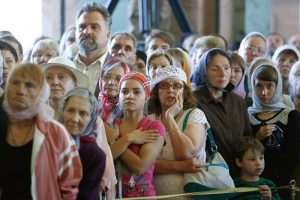We all know the story, or have heard versions of it. A new priest is assigned to a parish. Upon his arrival there, the priest discovers or discerns that the parish is in decline, or is struggling with serious issues of Church growth and health, and resolves to do something about it. He may be a priest with not only good ideas but inspiring vision, energy and talent, yet, at virtually every step of the way, he finds himself fighting resistance to even the concept of new ideas and different ways of doing things, ways that challenge conventional parish thinking and possibly even the very parishioners responsible for that thinking. After a while, especially with no backup or support from fellow clergy, including his own bishop, he gives up and goes on with parish life as it has been. And the declines only continue.
And this reminds me of an old maxim:
“If you keep doing what you’re already doing, you’re going to keep getting what you’ve already got.”
Few obstacles present more of a challenge to Church growth than resistance to change. That people, in general, fear change is natural. Change has to do with the unknown, and people fear those things they do not know or do not understand. Fear of change is also a spiritual issue, since Christians are, by definition, a people that are evolving, becoming holy, changing from one degree of glory to the next [2 Corinthians 3:18]. Yet, the view of a changeless God is often projected onto a people that need to change, with the resulting view that we, the people of an unchanging Faith and unchanging God, don’t ourselves have to change. This is utter nonsense.
Change is a part of our Faith. Baptism involves change. Confession and repentance involve change. Receiving the Body and Blood of our Lord involves change. Living a Christ-like life involves change, and yet we do not seem to fear those forms of change. We may not like them—the changes necessary may indeed be painful—but we do not seem to fear them because we recognize the benefit to our own personal spiritual life. It is only when we start talking about the way our corporate life seems to be going that we express the doubts and fears usually associated with change. If we fear change, then we fear God, but this kind of fear is not godly; rather, we fear Him because, at the heart of our relationship with Him, we do not trust Him, and change, if we are to understand it correctly, is about trusting God to take us from one place of being to another.
Why do we fear change? There is a very good reason why we fear change within our parishes. Corporate change—the kind of change at the level of overall parish life that we are talking about here—necessarily mandates us to admit one very difficult, one very painful thing: that the way we have been doing things may not have been working, may not be good, may not be right, may even have gotten us to the point of decline and poor Church health that we are now experiencing. It calls into question both personal and corporate judgment, administrative skills and leadership talents. It calls into question the supposedly well-thought out decisions we’ve made, decisions that may have been arrived at only after long discussions (or even heated arguments and exchanges), research and investigation.
People hate to admit they’re wrong. It’s hard enough for many people to do it in Confession, where anonymity can hide them; it’s even harder to do publicly when the parish is in decline and old methods, processes, ideas and the like are being examined and questioned. Nobody likes to look like they made a bad decision that has had, intentionally or not, disastrous consequences for corporate parish life.
However, as the Church universally—and as the autocephalous Church locally—we can no longer afford to keep our head in the sand and ignore the overall condition of our parishes on the North American continent. We have, over the last twenty years or so, been losing members at the rate of about ten percent per year. Membership roles at the parish, diocesan or national Church levels are in decline, and yet we do not seek to change the way we are doing things.
Remember: If we keep doing what we’re already doing, we’re going to keep getting what we’ve already got. We must constantly be aware of what we may be—or may not be—doing that is affecting our Church’s health and therefore growth. But if we are looking to change the way we do things, let’s remember that Christianity is fundamentally about change.
So what can be done? Here are a few suggestions.
1. ”Denial is not just a river in Egypt.” If your parish is in decline, face up to it and admit it. Nothing is worse for parish health than the rejection of the very reality – not to mention consequences – of parish problems.
2. Be open to new ideas. Many well-meaning Orthodox Christians think that we Orthodox do not need advice, counsel or training from anybody or any group that is not Orthodox. However, many non-Orthodox groups have a wealth of experience that we can tap into, experiences that may mirror our own and thereby offer us examples, corollaries and analogies to our own problems.
3. Seek help from those who can offer it, and learn from those who can teach it. This can come from laity or clergy who can offer help, counsel and advice in the area of Church growth and parish revitalization, especially laity or clergy – or groups who specialize in this field – who can offer training, mentoring and coaching in leading change in the Orthodox parish.
4. Be patient. When you start the process of change, don’t expect a quick fix. If your parish is in decline, it probably has taken a while to get to the point that has motivated the change. It will take a while to reverse that decline (be prepared for a five to seven year period) and start growing your parish again.
5. Trust your priest. The Grace of the Holy Spirit has been given to your priest in a very particular way. He has the charism to lead your church. Pray for him, and trust him that he may have some answers to some of the parish’s problems, even if they are not the kind of answers you wanted to hear.
6. Trust the laypersons in your parish who are called to this ministry. Evangelism is a gift of the Holy Spirit that is not given just to the clergy. There may be laymen and laywomen in your parish who have this gift and who know what needs to be done to get the message of Orthodox Christianity out.


















